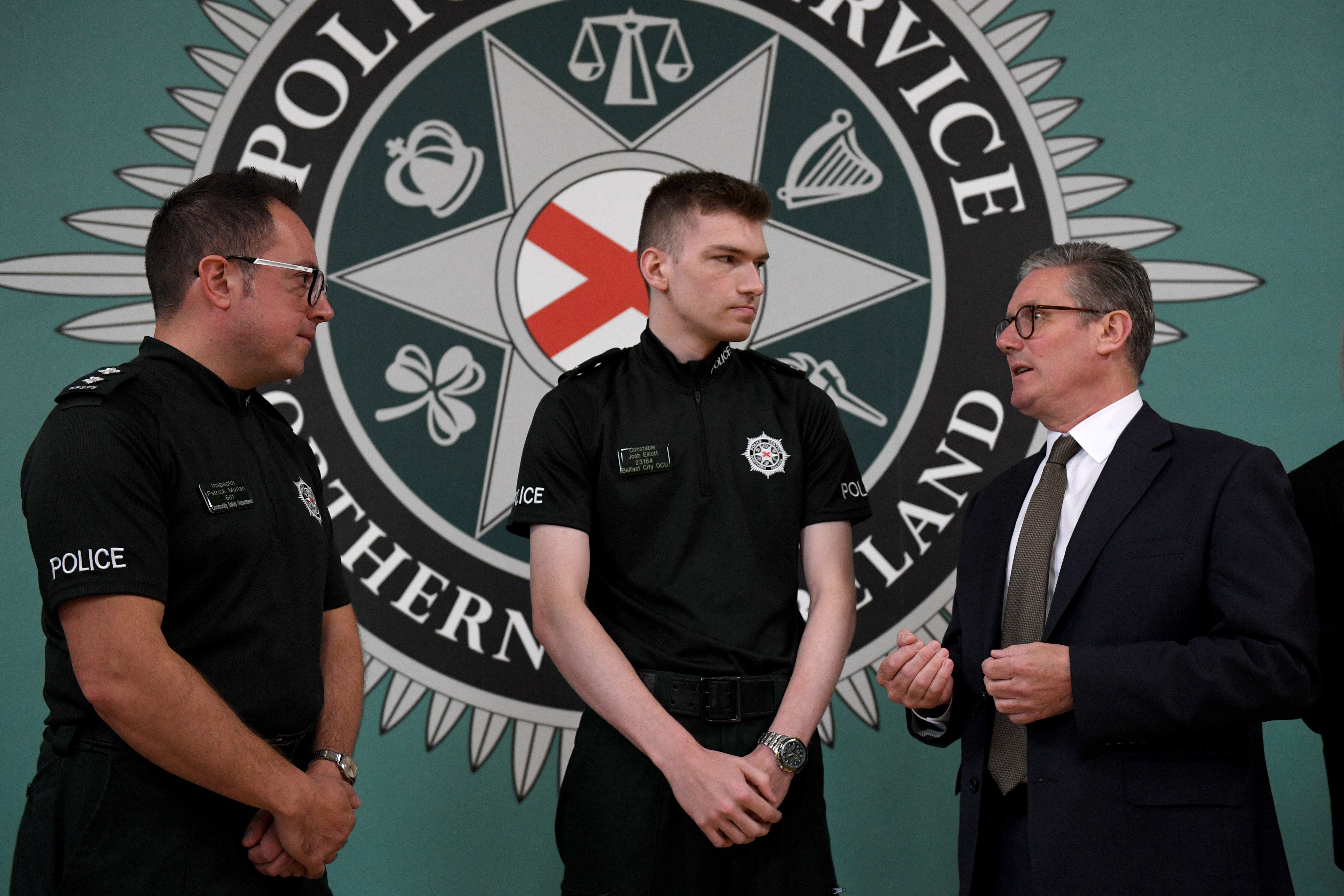Prime Minister meets police in Belfast injured in recent disorder
Sir Keir Starmer also met representatives from minority ethnic communities in Northern Ireland.

Your support helps us to tell the story
From reproductive rights to climate change to Big Tech, The Independent is on the ground when the story is developing. Whether it's investigating the financials of Elon Musk's pro-Trump PAC or producing our latest documentary, 'The A Word', which shines a light on the American women fighting for reproductive rights, we know how important it is to parse out the facts from the messaging.
At such a critical moment in US history, we need reporters on the ground. Your donation allows us to keep sending journalists to speak to both sides of the story.
The Independent is trusted by Americans across the entire political spectrum. And unlike many other quality news outlets, we choose not to lock Americans out of our reporting and analysis with paywalls. We believe quality journalism should be available to everyone, paid for by those who can afford it.
Your support makes all the difference.Prime Minister Sir Keir Starmer has personally thanked police officers who were injured during recent disorder, for their service.
During a visit to Belfast on Monday, the Prime Minister also met representatives from minority ethnic communities who had been targeted in violence in which a number of businesses were destroyed and a mosque attacked.
At least 20 police officers were injured in a spate of violent incidents in early August in Northern Ireland, after anti-immigration protests.
Bricks, petrol bombs and other missiles were thrown at officers as anti-immigration protests brought wider unrest to areas such as Londonderry.
Police Service of Northern Ireland Chief Constable Jon Boutcher said some of the officers are due to undergo surgery, and that he expects them to be OK, but the “nature of what they faced, even for some of those seasoned officers, has taken them aback”.
He said there had been some “really near misses to very serious injuries”.
Sir Keir, with Northern Ireland Secretary Hilary Benn, was by Mr Boutcher and Assistant Chief Constable Melanie Jones.
The Prime Minister said it had been “quite an intense few weeks”, to agreement from Ms Jones, who played a leading role in the PSNI’s response to the disorder, and referred to “some long days”.
With police numbers in Northern Ireland about 1,000 below the recommended strength, about 80 officers from Police Scotland have been in the region over the last week to support the PSNI.
Mr Boutcher told the Prime Minister they had been a “breath of fresh air”, and said they had “fitted in really well with our staff” and “understood the importance of it”.
The Prime Minister next met injured police officers, including Constable Josh Elliott, discussing with him how the community had “rallied round each other”. Sir Keir added: “That’s the real Northern Ireland.”
He later met leaders from a number of organisations which represent the minority ethnic community in Northern Ireland.
Among them was Nisha Tandon, the founder and director of ArtsEkta, which runs Belfast Mela, a major community festival which celebrates diversity.
She said the meeting had been very positive, and she was delighted to have had the opportunity to speak to the Prime Minister.
“It was more engagement than a lot of us have had with Stormont politicians and we very much welcomed it, he seemed to be in listening mode as we spoke to him,” she said.
“It was good to get that opportunity.”
The Prime Minister said at the end of his visit that one of his purposes had been to thank those police officers who had been on the front line and meet communities most affected by the disorder.
“My purpose was to say to them thank you for what they have done. We make big asks of the police officers, they step up and they deserve our thanks,” he said.
“I have also had the chance to speak to the PSNI senior leadership, and third, and very importantly, to speak to some of the communities most impacted about the fear, the anxiety that they have about the recent disorder.
“The disorder is intolerable. It is incapable of justification. It’s clearly racist and it does not represent the modern forward-looking Northern Ireland that I know that this place is.
“I do think it’s very important to come and say thank you, very important for the Prime Minister to come here to talk to the frontline officers face to face and humbly say thank you for what they and their colleagues have done.”
It comes as the PSNI released images of eight people they want to speak to in connection with their investigation into incidents of disorder and attacks on police officers since Saturday, August 3.